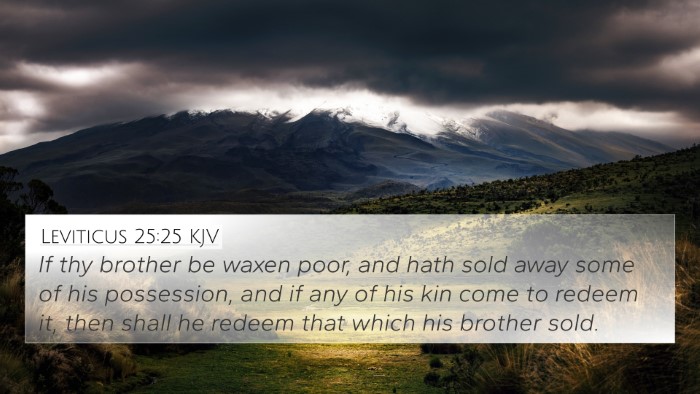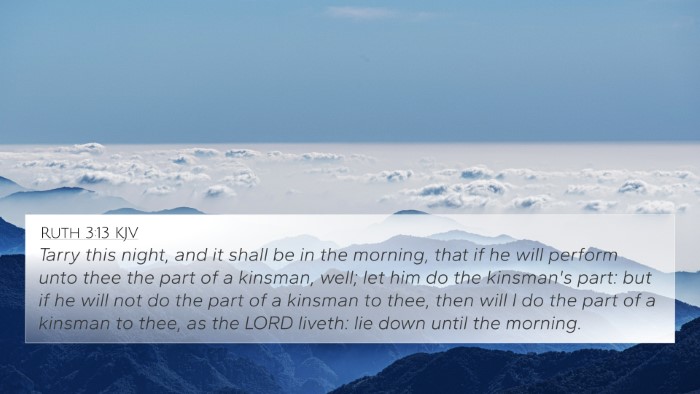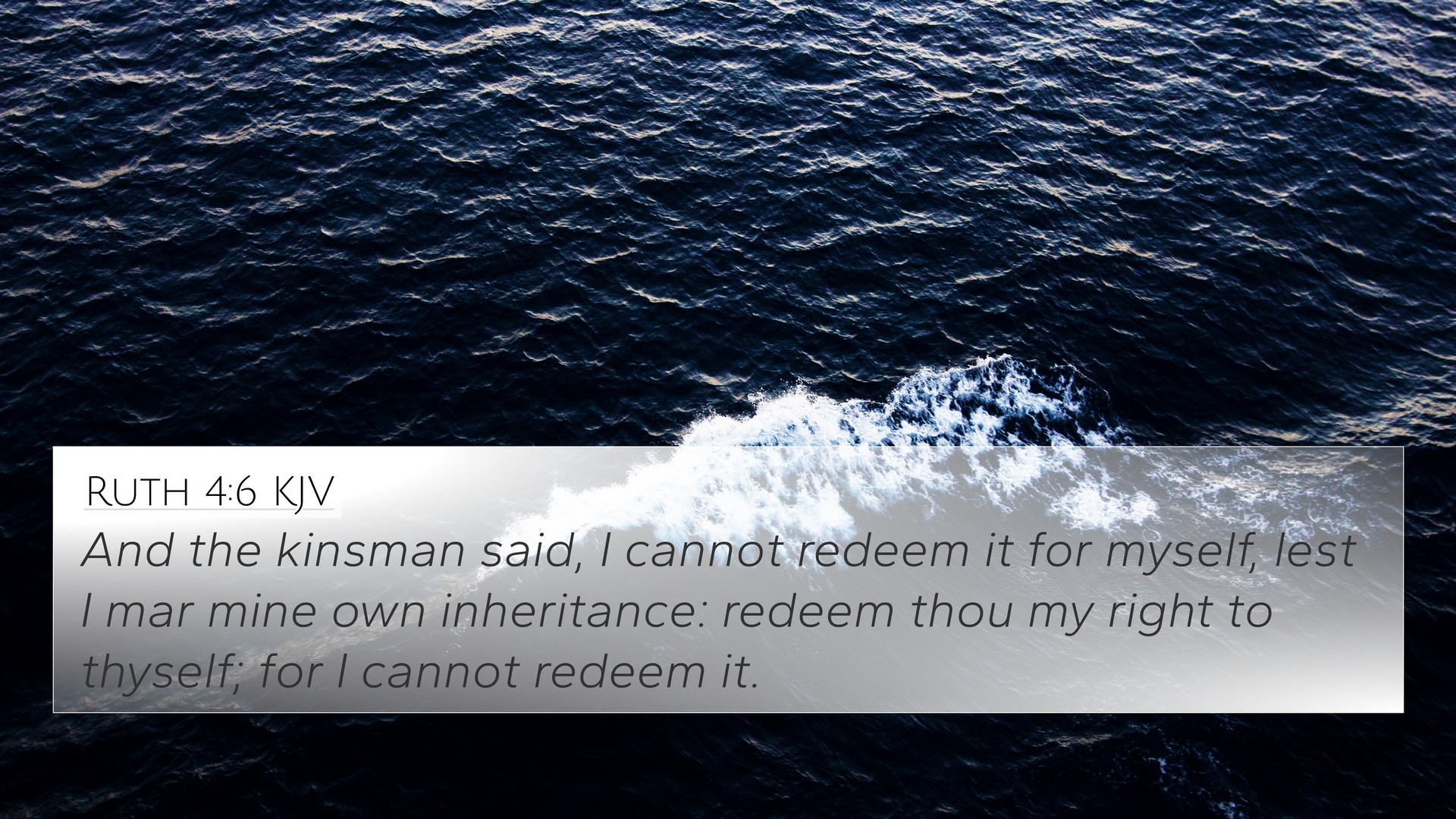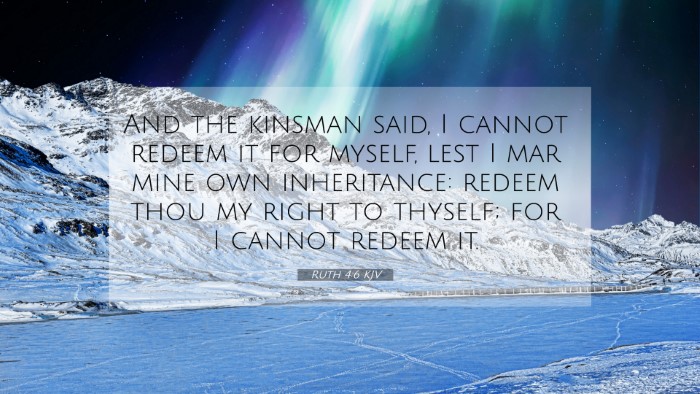Old Testament
Genesis Exodus Leviticus Numbers Deuteronomy Joshua Judges Ruth 1 Samuel 2 Samuel 1 Kings 2 Kings 1 Chronicles 2 Chronicles Ezra Nehemiah Esther Job Psalms Proverbs Ecclesiastes Song of Solomon Isaiah Jeremiah Lamentations Ezekiel Daniel Hosea Joel Amos Obadiah Jonah Micah Nahum Habakkuk Zephaniah Haggai Zechariah MalachiRuth 4:6 Similar Verses
Ruth 4:6 Cross References
And the kinsman said, I cannot redeem it for myself, lest I mar mine own inheritance: redeem thou my right to thyself; for I cannot redeem it.
Uncover the Rich Themes and Topics of This Bible Verse
Listed below are the Bible themes associated with Ruth 4:6. We invite you to explore each theme to gain deeper insights into the Scriptures.
Ruth 4:6 Cross Reference Verses
This section features a detailed cross-reference designed to enrich your understanding of the Scriptures. Below, you will find carefully selected verses that echo the themes and teachings related to Ruth 4:6 KJV. Click on any image to explore detailed analyses of related Bible verses and uncover deeper theological insights.

Leviticus 25:25 (KJV) »
If thy brother be waxen poor, and hath sold away some of his possession, and if any of his kin come to redeem it, then shall he redeem that which his brother sold.

Ruth 3:13 (KJV) »
Tarry this night, and it shall be in the morning, that if he will perform unto thee the part of a kinsman, well; let him do the kinsman's part: but if he will not do the part of a kinsman to thee, then will I do the part of a kinsman to thee, as the LORD liveth: lie down until the morning.
Ruth 4:6 Verse Analysis and Similar Verses
Bible Verse Meaning: Ruth 4:6
Ruth 4:6 states, "And the kinsman said, I cannot redeem it for myself, lest I mar mine own inheritance: redeem thou my right to thyself; for I cannot redeem it." This verse captures a pivotal moment in the Book of Ruth, where the concept of redemption is central. Here, the kinsman redeemer relinquishes his claim to the land that belonged to Naomi's husband due to concerns over his own inheritance.
Understanding the Context
The book of Ruth is set during the time of the judges and illustrates loyalty, devotion, and divine providence. Ruth, a Moabite widow, chooses to remain with her mother-in-law Naomi and returns with her to Bethlehem. The chapter illustrates the importance of familial duty and the laws regarding redemption.
Commentary Insights
Matthew Henry's Commentary
Matthew Henry emphasizes the importance of the kinsman's decision. He notes that the kinsman redeemer, driven by concern for his own estate, chose self-interest over obligation. Henry highlights that this decision ultimately paved the way for Boaz to step in, thus fulfilling God's plan for Ruth and Naomi.
Albert Barnes' Notes
Albert Barnes elaborates on the cultural implications of this decision, explaining that the kinsman forfeited not just a piece of land but also the opportunity to preserve the name of Naomi's husband through Ruth's offspring. He reflects on how familial obligations can sometimes conflict with personal interests, leading to significant spiritual lessons.
Adam Clarke's Commentary
Adam Clarke provides a detailed analysis of the legal ramifications of the kinsman's decision. He notes that the act of redemption involved not only acquiring property but also marrying Ruth to ensure the continuity of the family line. Clarke highlights that the reluctance of the kinsman exemplifies the challenges and complexities surrounding redemption, reflecting the tension between personal desire and divine purpose.
Key Themes and Cross-References
The verse explores several themes such as:
- Redemption and Responsibility: The idea that one’s obligations often require sacrifices.
- Divine Providence: God's hand guides events for a greater purpose.
- Self-Interest vs. Family Duty: The struggle between personal gain and familial obligations.
Related Bible Cross-References
Here are some biblical texts that relate to Ruth 4:6:
- Leviticus 25:25 - Laws concerning property redemption.
- Deuteronomy 25:5-10 - Instructions for a brother-in-law to marry the widow.
- Matthew 1:5 - Lists Ruth as part of Jesus' lineage, linking to the theme of redemption.
- Galatians 3:13-14 - Discusses Christ redeeming us from the curse of the law.
- John 10:14-15 - Jesus as the Good Shepherd who lays down His life for His sheep—a parallel of redemption.
- Isaiah 43:1 - God's assurance of redemption for His people.
- Romans 8:23 - The redemption of our bodies—a broader theological context of redemption.
Conclusion
Ruth 4:6 is a powerful verse that encapsulates the struggle between self-interest and the call to duty within family dynamics. The narrative not only sets the stage for David’s lineage but also reflects on God's overarching plan of redemption through the less conventional choices of His people. By studying this verse and its connections, believers can appreciate the depth and complexity of redemption in the biblical narrative.
Exploring Cross-References for Deeper Understanding
For those seeking to dive deeper into how scripture interconnects, engaging in cross-referencing biblical texts can unveil profound insights. Understanding the connections between Bible verses such as those in Ruth, Leviticus, and the New Testament can enrich one’s study and application of biblical principles in life.
Employing tools for Bible cross-referencing like concordances and specialized study guides can facilitate this exploration. Such resources help believers identify not only direct correlations between texts but also thematic connections across scripture, enhancing their spiritual understanding and practice.


